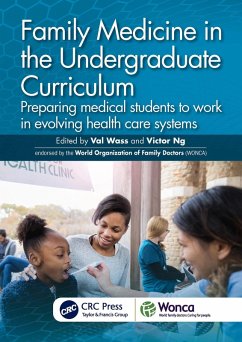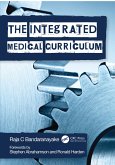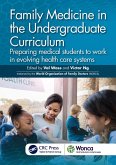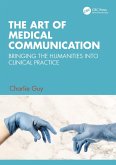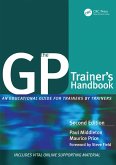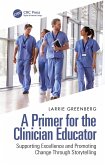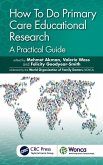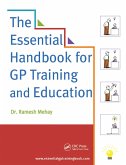Family Medicine in the Undergraduate Curriculum (eBook, ePUB)
Preparing medical students to work in evolving health care systems
Redaktion: Wass, Val; Ng, Victor
37,95 €
37,95 €
inkl. MwSt.
Sofort per Download lieferbar

19 °P sammeln
37,95 €
Als Download kaufen

37,95 €
inkl. MwSt.
Sofort per Download lieferbar

19 °P sammeln
Jetzt verschenken
Alle Infos zum eBook verschenken
37,95 €
inkl. MwSt.
Sofort per Download lieferbar
Alle Infos zum eBook verschenken

19 °P sammeln
Family Medicine in the Undergraduate Curriculum (eBook, ePUB)
Preparing medical students to work in evolving health care systems
Redaktion: Wass, Val; Ng, Victor
- Format: ePub
- Merkliste
- Auf die Merkliste
- Bewerten Bewerten
- Teilen
- Produkt teilen
- Produkterinnerung
- Produkterinnerung

Bitte loggen Sie sich zunächst in Ihr Kundenkonto ein oder registrieren Sie sich bei
bücher.de, um das eBook-Abo tolino select nutzen zu können.
Hier können Sie sich einloggen
Hier können Sie sich einloggen
Sie sind bereits eingeloggt. Klicken Sie auf 2. tolino select Abo, um fortzufahren.

Bitte loggen Sie sich zunächst in Ihr Kundenkonto ein oder registrieren Sie sich bei bücher.de, um das eBook-Abo tolino select nutzen zu können.
This practical guide is designed specifically to support those planning and conducting family medicine/primary care education within medical schools around the world. It offers medical educators a collection of pithy, easy to follow chapters, guiding the reader through the curriculum requirements with key references for further detail.
- Geräte: eReader
- mit Kopierschutz
- eBook Hilfe
Andere Kunden interessierten sich auch für
![The Integrated Medical Curriculum (eBook, ePUB) The Integrated Medical Curriculum (eBook, ePUB)]() Raja C. BandaranayakeThe Integrated Medical Curriculum (eBook, ePUB)38,95 €
Raja C. BandaranayakeThe Integrated Medical Curriculum (eBook, ePUB)38,95 €![Family Medicine in the Undergraduate Curriculum (eBook, PDF) Family Medicine in the Undergraduate Curriculum (eBook, PDF)]() Family Medicine in the Undergraduate Curriculum (eBook, PDF)37,95 €
Family Medicine in the Undergraduate Curriculum (eBook, PDF)37,95 €![The Art of Medical Communication (eBook, ePUB) The Art of Medical Communication (eBook, ePUB)]() Charlie GuyThe Art of Medical Communication (eBook, ePUB)33,95 €
Charlie GuyThe Art of Medical Communication (eBook, ePUB)33,95 €![The GP Trainer's Handbook (eBook, ePUB) The GP Trainer's Handbook (eBook, ePUB)]() Paul MiddletonThe GP Trainer's Handbook (eBook, ePUB)45,95 €
Paul MiddletonThe GP Trainer's Handbook (eBook, ePUB)45,95 €![A Primer for the Clinician Educator (eBook, ePUB) A Primer for the Clinician Educator (eBook, ePUB)]() Larrie GreenbergA Primer for the Clinician Educator (eBook, ePUB)38,95 €
Larrie GreenbergA Primer for the Clinician Educator (eBook, ePUB)38,95 €![How To Do Primary Care Educational Research (eBook, ePUB) How To Do Primary Care Educational Research (eBook, ePUB)]() How To Do Primary Care Educational Research (eBook, ePUB)23,95 €
How To Do Primary Care Educational Research (eBook, ePUB)23,95 €![The Essential Handbook for GP Training and Education (eBook, ePUB) The Essential Handbook for GP Training and Education (eBook, ePUB)]() Ramesh MehayThe Essential Handbook for GP Training and Education (eBook, ePUB)78,95 €
Ramesh MehayThe Essential Handbook for GP Training and Education (eBook, ePUB)78,95 €-
-
-
This practical guide is designed specifically to support those planning and conducting family medicine/primary care education within medical schools around the world. It offers medical educators a collection of pithy, easy to follow chapters, guiding the reader through the curriculum requirements with key references for further detail.
Dieser Download kann aus rechtlichen Gründen nur mit Rechnungsadresse in A, B, BG, CY, CZ, D, DK, EW, E, FIN, F, GR, HR, H, IRL, I, LT, L, LR, M, NL, PL, P, R, S, SLO, SK ausgeliefert werden.
Produktdetails
- Produktdetails
- Verlag: Taylor & Francis eBooks
- Seitenzahl: 300
- Erscheinungstermin: 6. Oktober 2023
- Englisch
- ISBN-13: 9781000953589
- Artikelnr.: 68780043
- Verlag: Taylor & Francis eBooks
- Seitenzahl: 300
- Erscheinungstermin: 6. Oktober 2023
- Englisch
- ISBN-13: 9781000953589
- Artikelnr.: 68780043
- Herstellerkennzeichnung Die Herstellerinformationen sind derzeit nicht verfügbar.
Val Wass OBE FRCGP FRCP MHPE PhD Professor of Medical Education in Primary Care, Aberdeen University; Emeritus Professor of Medical Education, Faculty of Medicine & Health, Keele University, UK; Former Chair, WONCA Working Party on Education Victor Ng MD CCFP(EM) MHPE FCFP ICD.D Assistant Dean Schulich School of Medicine and Dentistry, Western Canada; Associate Director, The College of Family Physicians of Canada; Chair, WONCA Working Party on Education
Section I - Integrating FM into the UG curriculum: Seizing the opportunity
1. Changing healthcare: Building the evidence for generalism
2. Defining family medicine
3. Social accountability
4. Developing an appropriate workforce for the future
5. Academic primary care: The importance of family medicine leaders and
role models
6. Barriers for change and how to overcome these
Section II - What to aim for: Principles of curriculum design
7. Humanism in family medicine
8. Addressing population needs
9. Addressing patient and family needs
10. Competency-based curricula
11. Designing an integrated curriculum
12. Values-based education: Integrating professionalism into the
curriculum
13. The formal, informal, and hidden curricula
Section III - Integrating FM into the curriculum: how to achieve this
14. Selecting for medical school entry: Nature or nurture?
15. Early exposure to family medicine
16. Family medicine placements: Apprenticeship learning
17. Longitudinal integrated clerkships
18. Interprofessional learning
19. Experiential learning for undergraduate medical students
Section IV - Teaching and learning: Methodologies
20. Blended learning
21. Clinical reasoning
22. Communication skills
23. Clinical and procedural skills
24. Handling risk, uncertainty, and complexity
25. Well-being
26. Supervision, mentorship, and coaching
27. Assessing clinical competency
Section V - Assessment
28. The principles of feedback
29. Principles of assessment and assessment tools
30. Struggling students and fitness to practise
31. Quality improvement and evaluation
Section VI - Evaluating teaching and learning across the curriculum
32. Evidence-based practice: Medical education research
33. Faculty development and continuous professional development
1. Changing healthcare: Building the evidence for generalism
2. Defining family medicine
3. Social accountability
4. Developing an appropriate workforce for the future
5. Academic primary care: The importance of family medicine leaders and
role models
6. Barriers for change and how to overcome these
Section II - What to aim for: Principles of curriculum design
7. Humanism in family medicine
8. Addressing population needs
9. Addressing patient and family needs
10. Competency-based curricula
11. Designing an integrated curriculum
12. Values-based education: Integrating professionalism into the
curriculum
13. The formal, informal, and hidden curricula
Section III - Integrating FM into the curriculum: how to achieve this
14. Selecting for medical school entry: Nature or nurture?
15. Early exposure to family medicine
16. Family medicine placements: Apprenticeship learning
17. Longitudinal integrated clerkships
18. Interprofessional learning
19. Experiential learning for undergraduate medical students
Section IV - Teaching and learning: Methodologies
20. Blended learning
21. Clinical reasoning
22. Communication skills
23. Clinical and procedural skills
24. Handling risk, uncertainty, and complexity
25. Well-being
26. Supervision, mentorship, and coaching
27. Assessing clinical competency
Section V - Assessment
28. The principles of feedback
29. Principles of assessment and assessment tools
30. Struggling students and fitness to practise
31. Quality improvement and evaluation
Section VI - Evaluating teaching and learning across the curriculum
32. Evidence-based practice: Medical education research
33. Faculty development and continuous professional development
Section I - Integrating FM into the UG curriculum: Seizing the opportunity
1. Changing healthcare: Building the evidence for generalism
2. Defining family medicine
3. Social accountability
4. Developing an appropriate workforce for the future
5. Academic primary care: The importance of family medicine leaders and
role models
6. Barriers for change and how to overcome these
Section II - What to aim for: Principles of curriculum design
7. Humanism in family medicine
8. Addressing population needs
9. Addressing patient and family needs
10. Competency-based curricula
11. Designing an integrated curriculum
12. Values-based education: Integrating professionalism into the
curriculum
13. The formal, informal, and hidden curricula
Section III - Integrating FM into the curriculum: how to achieve this
14. Selecting for medical school entry: Nature or nurture?
15. Early exposure to family medicine
16. Family medicine placements: Apprenticeship learning
17. Longitudinal integrated clerkships
18. Interprofessional learning
19. Experiential learning for undergraduate medical students
Section IV - Teaching and learning: Methodologies
20. Blended learning
21. Clinical reasoning
22. Communication skills
23. Clinical and procedural skills
24. Handling risk, uncertainty, and complexity
25. Well-being
26. Supervision, mentorship, and coaching
27. Assessing clinical competency
Section V - Assessment
28. The principles of feedback
29. Principles of assessment and assessment tools
30. Struggling students and fitness to practise
31. Quality improvement and evaluation
Section VI - Evaluating teaching and learning across the curriculum
32. Evidence-based practice: Medical education research
33. Faculty development and continuous professional development
1. Changing healthcare: Building the evidence for generalism
2. Defining family medicine
3. Social accountability
4. Developing an appropriate workforce for the future
5. Academic primary care: The importance of family medicine leaders and
role models
6. Barriers for change and how to overcome these
Section II - What to aim for: Principles of curriculum design
7. Humanism in family medicine
8. Addressing population needs
9. Addressing patient and family needs
10. Competency-based curricula
11. Designing an integrated curriculum
12. Values-based education: Integrating professionalism into the
curriculum
13. The formal, informal, and hidden curricula
Section III - Integrating FM into the curriculum: how to achieve this
14. Selecting for medical school entry: Nature or nurture?
15. Early exposure to family medicine
16. Family medicine placements: Apprenticeship learning
17. Longitudinal integrated clerkships
18. Interprofessional learning
19. Experiential learning for undergraduate medical students
Section IV - Teaching and learning: Methodologies
20. Blended learning
21. Clinical reasoning
22. Communication skills
23. Clinical and procedural skills
24. Handling risk, uncertainty, and complexity
25. Well-being
26. Supervision, mentorship, and coaching
27. Assessing clinical competency
Section V - Assessment
28. The principles of feedback
29. Principles of assessment and assessment tools
30. Struggling students and fitness to practise
31. Quality improvement and evaluation
Section VI - Evaluating teaching and learning across the curriculum
32. Evidence-based practice: Medical education research
33. Faculty development and continuous professional development
